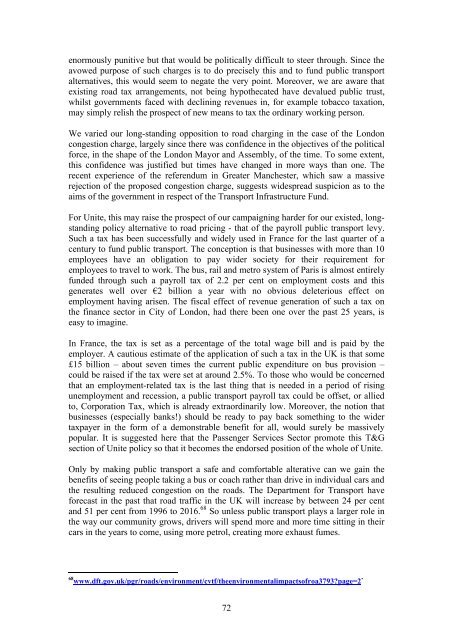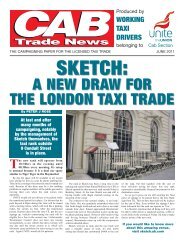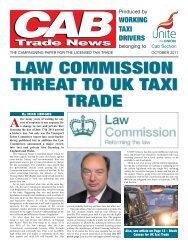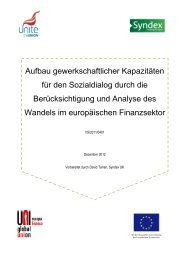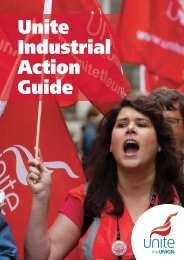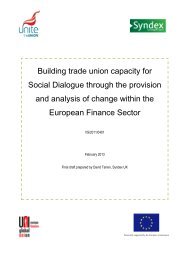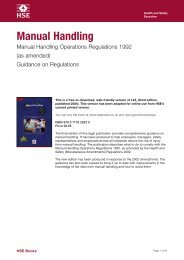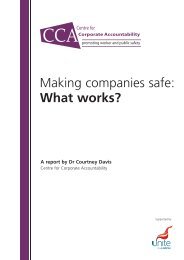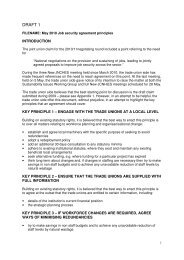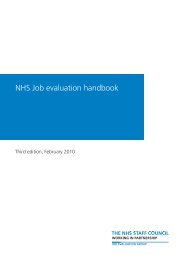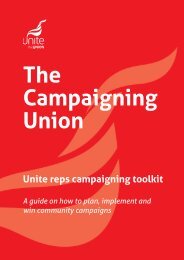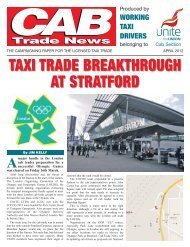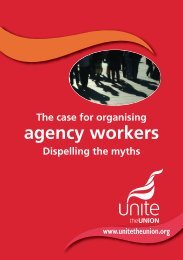Sustainable Transport and the Environment Guide - Unite the Union
Sustainable Transport and the Environment Guide - Unite the Union
Sustainable Transport and the Environment Guide - Unite the Union
You also want an ePaper? Increase the reach of your titles
YUMPU automatically turns print PDFs into web optimized ePapers that Google loves.
enormously punitive but that would be politically difficult to steer through. Since <strong>the</strong><br />
avowed purpose of such charges is to do precisely this <strong>and</strong> to fund public transport<br />
alternatives, this would seem to negate <strong>the</strong> very point. Moreover, we are aware that<br />
existing road tax arrangements, not being hypo<strong>the</strong>cated have devalued public trust,<br />
whilst governments faced with declining revenues in, for example tobacco taxation,<br />
may simply relish <strong>the</strong> prospect of new means to tax <strong>the</strong> ordinary working person.<br />
We varied our long-st<strong>and</strong>ing opposition to road charging in <strong>the</strong> case of <strong>the</strong> London<br />
congestion charge, largely since <strong>the</strong>re was confidence in <strong>the</strong> objectives of <strong>the</strong> political<br />
force, in <strong>the</strong> shape of <strong>the</strong> London Mayor <strong>and</strong> Assembly, of <strong>the</strong> time. To some extent,<br />
this confidence was justified but times have changed in more ways than one. The<br />
recent experience of <strong>the</strong> referendum in Greater Manchester, which saw a massive<br />
rejection of <strong>the</strong> proposed congestion charge, suggests widespread suspicion as to <strong>the</strong><br />
aims of <strong>the</strong> government in respect of <strong>the</strong> <strong>Transport</strong> Infrastructure Fund.<br />
For <strong>Unite</strong>, this may raise <strong>the</strong> prospect of our campaigning harder for our existed, longst<strong>and</strong>ing<br />
policy alternative to road pricing - that of <strong>the</strong> payroll public transport levy.<br />
Such a tax has been successfully <strong>and</strong> widely used in France for <strong>the</strong> last quarter of a<br />
century to fund public transport. The conception is that businesses with more than 10<br />
employees have an obligation to pay wider society for <strong>the</strong>ir requirement for<br />
employees to travel to work. The bus, rail <strong>and</strong> metro system of Paris is almost entirely<br />
funded through such a payroll tax of 2.2 per cent on employment costs <strong>and</strong> this<br />
generates well over €2 billion a year with no obvious deleterious effect on<br />
employment having arisen. The fiscal effect of revenue generation of such a tax on<br />
<strong>the</strong> finance sector in City of London, had <strong>the</strong>re been one over <strong>the</strong> past 25 years, is<br />
easy to imagine.<br />
In France, <strong>the</strong> tax is set as a percentage of <strong>the</strong> total wage bill <strong>and</strong> is paid by <strong>the</strong><br />
employer. A cautious estimate of <strong>the</strong> application of such a tax in <strong>the</strong> UK is that some<br />
£15 billion – about seven times <strong>the</strong> current public expenditure on bus provision –<br />
could be raised if <strong>the</strong> tax were set at around 2.5%. To those who would be concerned<br />
that an employment-related tax is <strong>the</strong> last thing that is needed in a period of rising<br />
unemployment <strong>and</strong> recession, a public transport payroll tax could be offset, or allied<br />
to, Corporation Tax, which is already extraordinarily low. Moreover, <strong>the</strong> notion that<br />
businesses (especially banks!) should be ready to pay back something to <strong>the</strong> wider<br />
taxpayer in <strong>the</strong> form of a demonstrable benefit for all, would surely be massively<br />
popular. It is suggested here that <strong>the</strong> Passenger Services Sector promote this T&G<br />
section of <strong>Unite</strong> policy so that it becomes <strong>the</strong> endorsed position of <strong>the</strong> whole of <strong>Unite</strong>.<br />
Only by making public transport a safe <strong>and</strong> comfortable alterative can we gain <strong>the</strong><br />
benefits of seeing people taking a bus or coach ra<strong>the</strong>r than drive in individual cars <strong>and</strong><br />
<strong>the</strong> resulting reduced congestion on <strong>the</strong> roads. The Department for <strong>Transport</strong> have<br />
forecast in <strong>the</strong> past that road traffic in <strong>the</strong> UK will increase by between 24 per cent<br />
<strong>and</strong> 51 per cent from 1996 to 2016. 68 So unless public transport plays a larger role in<br />
<strong>the</strong> way our community grows, drivers will spend more <strong>and</strong> more time sitting in <strong>the</strong>ir<br />
cars in <strong>the</strong> years to come, using more petrol, creating more exhaust fumes.<br />
68 www.dft.gov.uk/pgr/roads/environment/cvtf/<strong>the</strong>environmentalimpactsofroa3793?page=2`<br />
72


